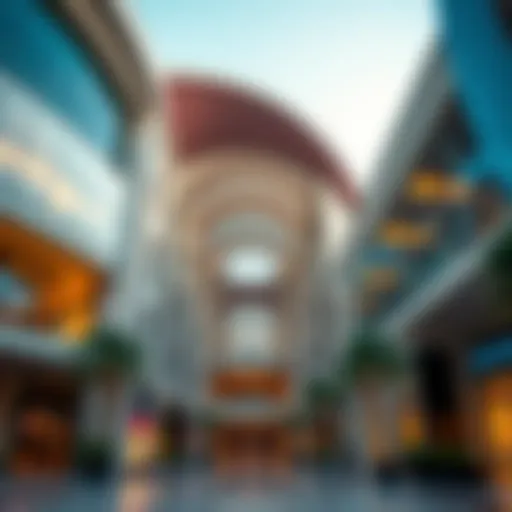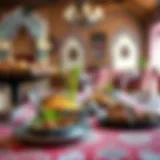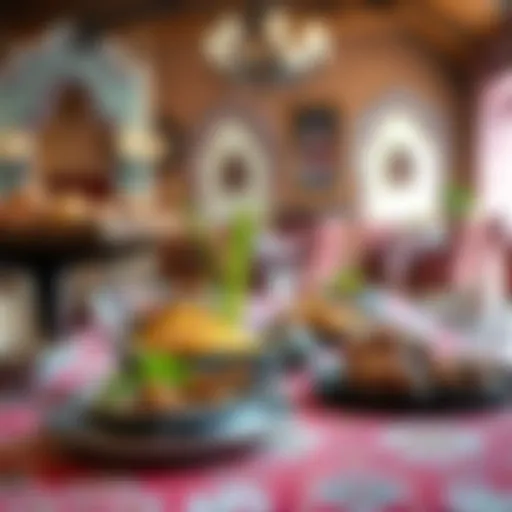Iftar Today in Dubai: A Cultural and Culinary Journey
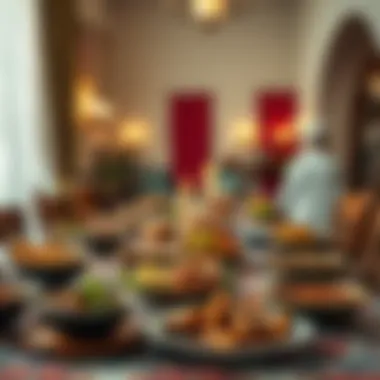
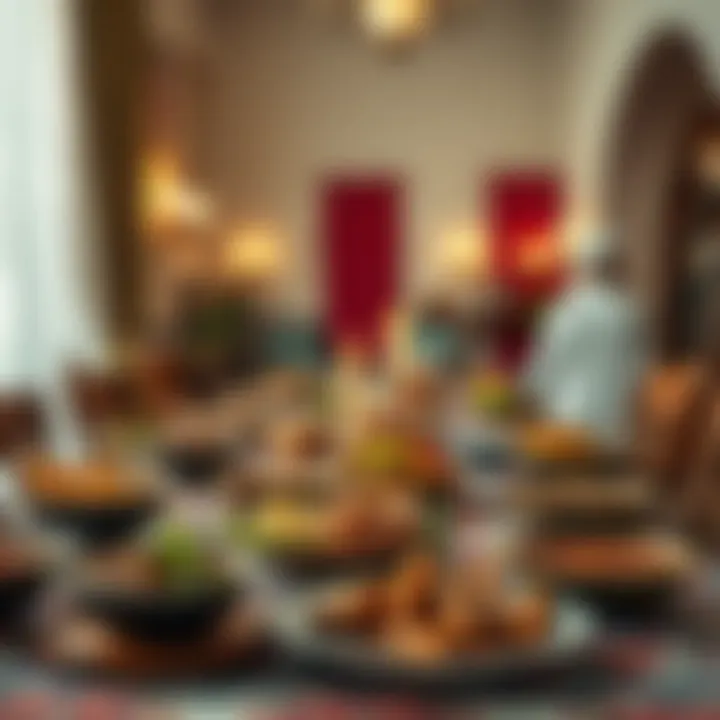
Intro
As the sun dips below the horizon during Ramadan, Dubai comes alive in a culinary symphony, resonating with traditions and flavors that embody the spirit of Iftar. This meal—breaking the fast—holds immense cultural significance, uniting families, friends, and communities in a celebration of togetherness. In today’s Dubai, Iftar evolves, reflecting a vibrant culinary landscape that blends rich Emirati heritage with contemporary gastronomic innovations.
From the bustling streets to luxurious hotels, the city offers a staggering array of options for breaking fast. Whether you’re a local resident or a visitor, the experience is not just about the food but the social connections forged over shared meals. During this special time of year, the aromas of roasted meats, freshly baked bread, and dates waft through the air, enticing you to partake in traditions that have been passed down through generations.
As we journey through today’s Iftar scene in Dubai, we’ll uncover not only the diverse dishes available but also the communal joy that marks the occasion. Get ready to explore local markets, upscale dining, and everything in-between, revealing how every corner of this bustling metropolis contributes to a rich tapestry of flavors and culture.
Cultural Significance of Iftar
Iftar, the evening meal that breaks the fast during Ramadan, carries a profound cultural significance in Dubai and across the Arab world. It transcends beyond mere nourishment; it is a celebration of community, family, and faith. This meal is an opportunity for connection, where friends and family gather to share not just food, but also stories and traditions. As the sun sets, the act of breaking bread becomes an affirmation of shared beliefs and values.
The ambiance during Iftar is unique, often filled with joy and laughter. Various foods are prepared, incorporating local flavors and dishes which enhance the sense of togetherness that defines this time. Particularly in Dubai, where cultures intermingle, each meal can be a reflection of diverse backgrounds coming together. It's common to find tables filled with an array of cuisines that are symbolic of the city itself: a blend of heritage and modernity.
Furthermore, Iftar represents an opportunity for charitable acts. Many community groups and restaurants create initiatives to serve meals to those who cannot afford them. This acts not only as a gesture of goodwill, but also strengthens social bonds among people, making the entire month more inclusive and enriching.
"Food is not just about sustenance; it is about bringing people together, especially in a vibrant city like Dubai."
Historical Context
Historically, the practice of Iftar dates back to the time of Prophet Muhammad, who emphasized the importance of sharing food. The tradition has roots in Arab culture, where hospitality is highly esteemed. Guests are treated with high regard, and sharing meals symbolizes respect and camaraderie. Over the ages, this practice has evolved, yet its essence remains unchanged. In Dubai, traditional dishes like dates and water are consumed first, following the Sunnah, or custom, of the Prophet.
In the past, Iftar was often a simple gathering, yet with the growth of Dubai into a global hub, it has transformed into a grand affair for many. Whether in homes or lavish hotels, the significance of family gatherings has expanded. The act of breaking fast is considered a moment to express gratitude and reflection, fostering a deeper connection to one’s faith and cultural identity.
Modern Observations
Today, the way Iftar is observed reflects a remarkable blend of tradition and innovation. While the core remains rooted in cultural practices, many aspects have modernized. In Dubai, one can find Iftar meals offered in high-end restaurants featuring gourmet twists on classic dishes. Options range from lavish buffets with international fare to themed events that celebrate culinary art. The luxury dining scene has embraced Iftar with unique flair, showcasing an array of dishes that represent different cultures, catering to the city's diverse population.
Social media has also influenced modern Iftar gatherings. Many families and restaurants love to showcase their meals online, sharing the experience of this sacred meal with a broader audience. Video recipes and images flood feeds, inspiring new generations to embrace the customs while adding their unique spin on traditional recipes. More than ever, Iftar has become a visual feast as much as it is a culinary delight.
In Dubai, the communal spirit of Iftar continues to thrive, with communities coming together in parks and venues to share meals. Traditional educational programs are organized, where individuals come together to learn about the significance of Ramadan, fostering a sense of unity.
Diversity of Iftar Offerings
Iftar in Dubai is not just a meal; it's an intricate tapestry of flavors, traditions, and cultures woven together. The significance of diverse Iftar offerings lies in their ability to not only reflect the local heritage but also showcase the eclectic influences that define this vibrant city. For both residents and visitors, the vast array of options available for breaking the fast provides a delightful opportunity to explore culinary artistry and share experiences.
Traditional Emirati Dishes
When one thinks of Iftar offerings in Dubai, it's impossible to overlook the traditional Emirati dishes that grace the table. These dishes, often passed down through generations, form the backbone of the Iftar experience.
- Harees: A classic dish made from wheat and meat, cooked slowly until it becomes a thick porridge. It carries a comforting warmth, perfect for breaking the fast on cooler evenings.
- Stuffed Camel: Considered a dish reserved for festivities, its preparation involves stuffing an entire camel with various ingredients. While not commonly found on every Iftar table, its mention underscores the richness of Emirati culinary heritage.
- Ghuzi: Roasted lamb served on a bed of seasoned rice and nuts, this dish is emblematic of Emirati hospitality. Each bite reflects the essence of local flavors mixed with spices like cardamom and cinnamon.
Beyond these, you’ll often find recipes with roots in local agriculture, such as dates, cucumbers, and various herbs, which play a significant role in fostering the connection to the land.
The presentation of these dishes carries equal importance; woven baskets and traditional clay pots enhance the visual appeal. Eating together is part of the tradition, often bringing family and friends closer, encouraging a sense of community.
International Cuisine
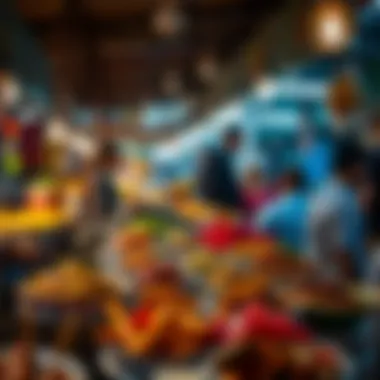
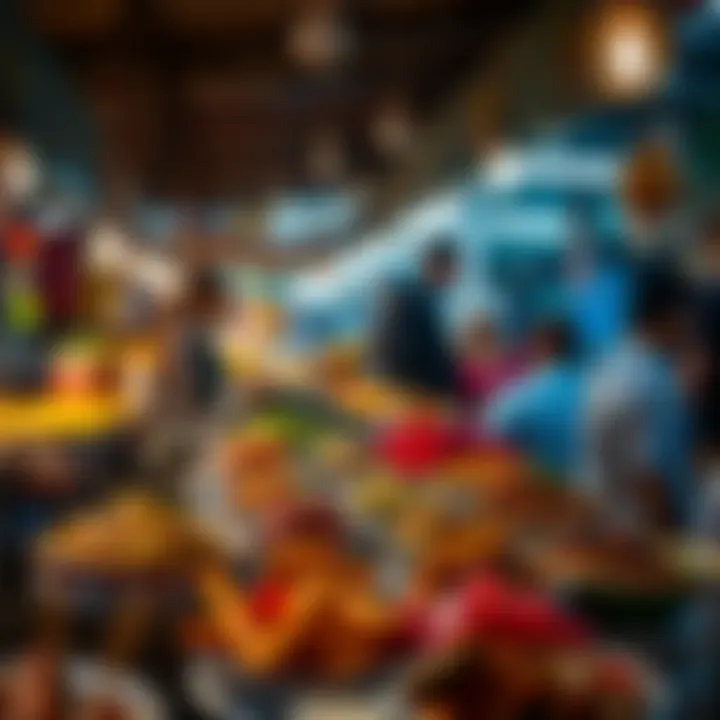
While traditional Emirati dishes are a staple during Iftar, the multicultural fabric of Dubai allows for a varied international culinary experience. Restaurants across the city, from high-end eateries to local diners, present a fusion of flavors from around the globe, catering to diverse palates.
- Indian Biryani: A popular choice, often characterized by layers of fragrant rice and marinated meat, bringing a burst of spices that tantalize the senses.
- Lebanese Mezze: Dishes like hummus, tabbouleh, and kebabs make for a vibrant spread that encourages sharing. These bite-sized portions embody the spirit of Iftar, fostering conviviality.
- North African Tagines: Slow-cooked stews served in intricately designed pots add a unique touch to the dining experience. Ingredients such as preserved lemons and olives infuse these dishes with rich, complex flavors.
Moreover, the integration of fast-food chains and trendy cafes means burgers, sushi, and even vegan options have found their way into the Iftar lineup. This blending of cuisines not only reflects Dubai's global status but also illustrates how culinary boundaries are consistently being crossed.
"The Iftar table is more than just food; it represents a moment of unity and celebration, inviting people to share, taste, and connect."
Thus, the diversity in Iftar offerings represents not merely a meal but an extraordinary opportunity to discover the confluence of cultural identities. This experience is a feast for the senses, marking a unique aspect of the culinary landscape that is distinctly Dubai.
By embracing both traditional and international dishes, Dubai ensures that each Iftar not only nourishes the body but also draws in a rich narrative of its cultural mosaic.
Top Places for Iftar in Dubai
When it comes to experiencing Iftar in Dubai, the choice of location can greatly enhance the meal experience. The ambiance, the community spirit, and the quality of food all play pivotal roles in how one enjoys breaking their fast. With a plethora of options available, offering everything from lavish buffet spreads to cozy hidden eateries, Dubai caters to every palate and preference. Choosing the right venue enhances not just the culinary journey but also the cultural immersion.
Luxury Hotels
Staying in opulent surroundings adds a layer of elegance to the Iftar experience. Luxury hotels in Dubai offer various unique offerings that allow guests to enjoy traditional meals with a distinct flair. The settings are often breathtaking, with contemporary Arabic architecture blending seamlessly with historic influences.
Signature Buffets
One of the standout features of luxury hotels during Ramadan are their signature buffets. These lavish spreads are designed to offer guests an expansive selection of traditional dishes alongside international favorites. With items like succulent grilled meats, fragrant rice cooked with rich spices, and an array of refreshing salads, these buffets appeal to both locals and visitors alike. The key character of these buffets lies in their variety and quality.
For those seeking a grand feast, diving into a lavish buffet is incredibly enticing. The best part? Most places incorporate live cooking stations.
- Advantages: You can find something for everyone and it often includes desserts that celebrate the spirit of Ramadan, like kunafa and qatayef.
- Disadvantages: Buffets can get crowded and drinks may not be included in the price, which can add to the final bill.
Ambience and Service
It's not just about the food; the atmosphere plays a massive part in the Iftar experience. Luxury hotels typically put an emphasis on creating a welcoming environment. Open-air settings are quite popular, allowing diners to enjoy the gentle evening breeze. Service is another hallmark of luxury dining. Staff are trained to provide a seamless experience that enhances the enjoyment of the meal.
With elements like decorative lighting, live traditional music, and intricate table settings, the ambience can often feel like an event rather than just a meal.
- Advantages: The attentiveness of the staff means specials options can be recommended, making the dining experience personalized.
- Disadvantages: Higher price points might make it less accessible for everyone.
Local Restaurants
For those looking to explore Iftar offerings beyond the realm of lavish hotels, Dubai's local restaurants provide intimate settings with a homely touch. These venues often offer authentic flavors from the region and reflect the true essence of Emirati culture.
Hidden Gems
There’s something special about discovering a hidden gem amidst the bustling streets. Often family-owned, these restaurants may not advertise widely but are beloved in the community. They typically provide dishes that are made from age-old recipes, passed down through generations. From hearty lamb dishes to flavorful dips and freshly baked bread, the experience here can feel deeply personal.
- Key Characteristic: Authenticity is high on the list; prices tend to be significantly lower than more well-known spots.
- Advantages: Less crowded than major tourist areas, giving guests the chance to enjoy meals at a leisurely pace.
- Disadvantages: Limited seating space can mean a wait on busy nights.
Family-Friendly Options
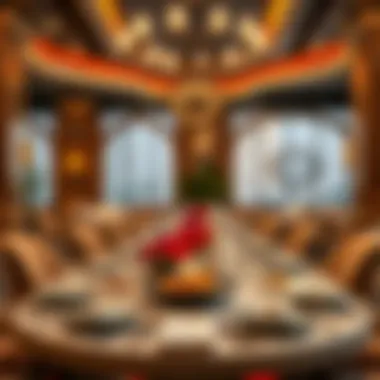
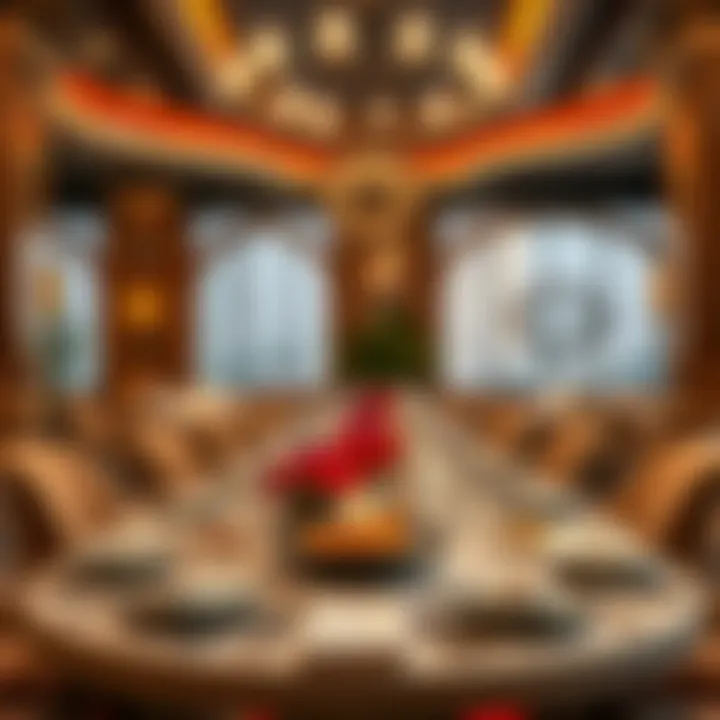
Dubai's dining culture is incredibly accommodating for families, and during Ramadan, many local restaurants go above and beyond to cater to larger groups. Family-friendly options often include special kids menus and more relaxed environments conducive to children.
These venues have spaces where kids can enjoy traditional activities while waiting for their meal. The warmth of familial settings means that conversations flow easily, creating a lively yet comforting atmosphere.
- Key Characteristic: Many of these restaurants are equipped with play areas or activities for kids, ensuring a pleasant experience for parents.
- Advantages: These places typically offer great value for families, making it easy to share a meal without breaking the bank.
- Disadvantages: Diners may sometimes find the noise levels higher, with families and children enjoying their meals together.
Street Food Experiences
Street food during Ramadan takes on a life of its own in Dubai. Open-air stalls and food trucks often pop up, serving quick bites that cater to those hungry after a long day of fasting. The vibrant atmosphere of street markets adds to the excitement of trying different foods from various cultural influences. With everything from shawarma to samosas being sold, the options can feel endless.
Street food encapsulates the sense of community during Ramadan and many diners find joy in sharing food on the go or having it as a takeaway to enjoy at home. The casual nature of street dining makes it an accessible choice for many, presenting a perfect platform for food lovers to explore the culinary landscape of Dubai.
Unique Iftar Experiences
Experiencing Iftar in Dubai offers more than just a culinary delight; it immerses one in the wonderful tapestry of Emirati tradition and modern adaptation. There is a undeniable thrill in witnessing how food, culture, and community intertwine during this sacred month. Unique Iftar experiences cater to diverse tastes and preferences, providing a chance to celebrate in environments that go beyond the conventional restaurant setting.
Whether it's the serenity of the desert or the allure of dining on a cruise, these experiences not only tantalize the palate but also create lasting memories. They serve as a reminder of the beauty in shared moments, emphasizing the importance of community and togetherness during Ramadan.
Iftar in the Desert
Imagine breaking your fast under the vast expanse of an endless sky where the only sounds are the soft whispers of the wind and the distant call of nature. Iftar in the desert offers such an enchanting experience. A widespread choice among locals and tourists alike, this setup allows participants to embrace the heart of Emirati culture in its truest form.
Packages for desert Iftar often include a mix of traditional dishes, like harees and shawarma, paired with refreshing rosewater lemonade. For many, the star attraction isn't just the food but the ceremonial ambiance. After the long day of fasting, gathering around a campfire, sharing stories, and indulging in sumptuous grub is deeply fulfilling. The tranquility of the desert enhances this experience, connecting individuals to both heritages and the earth itself.
Essential elements of a fantastic desert Iftar include:
- Authentic Food: Culinary offerings are often prepared by skilled chefs who understand the ways of traditional Emirati cuisine.
- Cultural Activities: Often, there are activities such as henna painting, falconry displays, or Belly dancing that add a unique touch to the evening.
- Scenic Views: The panoramic views of the sunset followed by starlit skies give a naturally romantic backdrop, perfect for family gatherings or even corporate celebrations.
Cruise Dining
Another unique way to enjoy Iftar in Dubai is through cruise dining. Picture yourself gliding along the tranquil waters of the Dubai Marina or the historical Dubai Creek. The atmosphere is inviting as gentle waves lap against the boat's hull, the city’s skyline twinkling on one side, while the water reflects a tapestry of colors from the setting sun on the other.
Cruise dining can be stunning, with many vessels offering an elaborate buffet featuring a medley of international cuisines. Think of finely crafted dishes from across the globe, including Asian stir-fries, Indian curries, and of course, classic Emirati bites. The fusion of cultural food with the backdrop of serene waters brings a novel aesthetic to Iftar.
Key features of a cruise dining experience include:
- A Diverse Menu: Guests can savor a wide variety of foods that cater to all palates, ensuring that dietary needs are met without compromising on flavor.
- Live Entertainment: Many cruises feature live music, traditional performances, or DJs, creating an engaging atmosphere.
- Networking Opportunities: The relaxed setting is perfect for professionals. Besides enjoying the gastronomic offerings, it presents a chance to mingle and discuss prospects amidst beautiful surroundings.
"Dining on the water during Iftar not only fills the stomach but also nourishes the soul. It is a celebration of flavors and connections."
To learn more about unique culinary experiences during this sacred month, check resources like Visit Dubai or explore popular conversations on Reddit.
The unique experiences surrounding Iftar in Dubai exemplify how food can bridge gaps, honor tradition, and foster community spirit. Engaging in these activities, whether it is in the serene desert or on a leisurely cruise, paves the way for deeper connections during the month of Ramadan.
Community and Iftar
Iftar is not merely about the meal; it serves as a bridge that connects people, reinforcing social bonds within the community. As the sun sets during Ramadan, the call to break fast transcends individual homes, inviting families and friends to gather around shared tables. This spirit of togetherness is amplified in Dubai, where diverse cultures converge, making the Iftar experience rich and multifaceted.
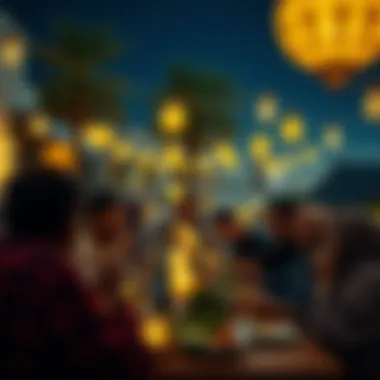
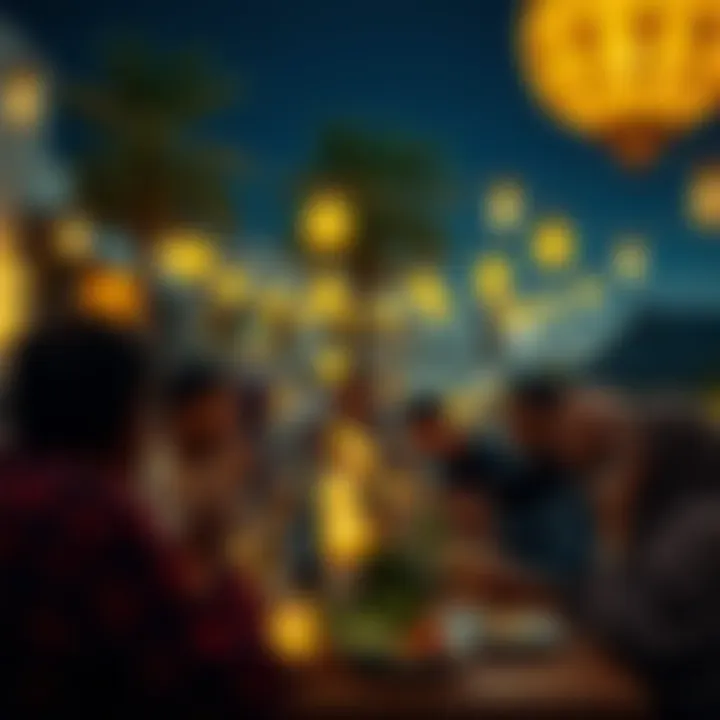
With the pace of life in the city, there’s something unique about slowing down and sharing a meal with others. Whether it’s a lavish buffet at a hotel or a simple gathering at a friend’s house, the act of breaking fast ignites a sense of unity and belonging. It’s a reminder that amidst the hustle and bustle, community ties remain strong.
Charitable Initiatives
During Ramadan, a wave of generosity flows through the community, with numerous charitable initiatives gaining momentum. Many organizations and groups dedicate themselves to preparing and distributing Iftar meals to those in need. Local mosques and community centers often take charge of these efforts, ensuring that no one has to break their fast alone.
- Meals for the Needy: Numerous charities operate in Dubai during this month, providing meals to low-income families or workers. This initiative helps foster compassion among residents, reminding them to share their blessings.
- Food Drives: It’s common to see organized food drives where people donate essentials and prepared meals. These drives often act as a platform for community members to connect and collaborate, volunteering not just to provide food but also to build relationships.
"The essence of Ramadan is sharing, and through these charitable initiatives, we create a stronger, more empathetic community."
Such initiatives not only impact those receiving the aid but also enrich the lives of the volunteers. Participating in these charitable acts can deepen one's sense of purpose and belonging within the community.
Community Gatherings
Community gatherings during Iftar showcase the vibrant tapestry of cultures in Dubai. These events offer a unique platform for people to come together, exchange stories, and enjoy diverse cuisines.
- Public Iftar Events: Many parks and public spaces host open Iftar events, inviting anyone to share in the meal. These gatherings are often marked by a blend of traditional Emirati dishes and international flavors, reflecting the city’s multicultural identity.
- Cultural Programs: Local organizations frequently arrange cultural programs, where participants not only feast but also enjoy music and performances. These events promote understanding and appreciation for different traditions.
These gatherings foster an environment where cultural exchange thrives, and friendships blossom.
The focus on community during Iftar embodies the spirit of togetherness, demonstrating that even in a bustling city like Dubai, there is room for connection and shared experiences. As the month progresses, these communal aspects provide a sense of rhythm and meaning, enriching both individual lives and the city at large.
Health and Well-being During Iftar
Iftar isn't merely a meal; it's a significant social and spiritual event for many. As the sun dips below the horizon, signaling the end of a day of fasting, it becomes vital to approach this feast with a sense of mindfulness about health and nutrition. In today's fast-paced world, particularly in Dubai with its bustling Iftar scene, understanding the balance of what goes on the plate can foster a more enriching experience.
Nutrition Considerations
As the day begins to close and the call to prayer rings out, individuals eagerly anticipate breaking their fast. However, it’s imperative to think of nutrition in these moments of indulgence. Here are some considerations:
- Balanced Meals: It's crucial to balance carbohydrates, protein, and fats. Traditional meals often contain rice, protein, and vegetables, which ideally should form a colorful plate. For instance, quinoa tabbouleh paired with grilled chicken can provide wholesome nutrition compared to deep-fried options.
- Sugars and Sweets: While sweet treats like kunafa and maamoul are delightful, moderation is key. Immediately reaching for these after fasting can lead to a sugar crash, impacting the rest of the evening.
- High-fiber Foods: Incorporating lentils or whole grains can help maintain energy levels and satiety, aiding digestion. Fattoush salad, packed with assorted vegetables, not only adds color but also boosts nutrient intake.
- Planning Ahead: This isn't just about consumption on the day itself; understanding what one eats regularly throughout Ramadan can set a foundation for healthier habits. Pre-planning meals can prevent poor food choices that might be high in calories but low in nutrients.
Hydration Strategies
After a long day of fasting, proper hydration is the crux of any Iftar meal. Many people often overlook this, but it influences how well one feels through the evening. Here are solid strategies to consider:
- Start Slow: Rather than downing water all at once, it may be beneficial to sip slowly after breaking the fast. This can provide comfort to the digestive system. Soaking dates in warm water before consumption is also a practice that can help prepare the stomach.
- Electrolyte Sources: Drinks like coconut water can replenish electrolytes lost during the day. Adding a dash of salt to food can also help retain water throughout the evening.
- Herbal Teas: Calm the stomach and aid digestion by including herbal teas after Iftar. Peppermint or chamomile can be particularly soothing.
- Monitor Intake: It’s often easy to forget about water while engaging with family and friends. Keeping a bottle nearby can serve as a reminder to drink more frequently.
"Health isn’t just about what you’re eating. It’s also about what you’re thinking and saying."
By paying attention to these health and hydration strategies during Iftar, one can fully embrace the spirit of Ramadan while sustaining well-being throughout the fast.
In Dubai, where culinary temptations and glory know no bounds, being conscious about what and how we consume can elevate the entire Iftar experience—turning every meal into an opportunity for nourishment and communion with others.
Culmination
The exploration of Iftar during Ramadan in Dubai serves as a vivid illustration of cultural richness and community spirit. This article sheds light on the significant role that Iftar plays, not just as a meal, but as a communal experience that brings people together. Taking the time to break the fast collectively fosters unity and encourages sharing, aligning with the values deeply rooted in Emirati culture.
It’s essential to appreciate how Iftar transcends mere sustenance. It's a celebration of various culinary traditions, showcasing a vibrant tapestry of flavors that reflect Dubai’s diverse population. By highlighting both traditional Emirati dishes and international cuisines, we acknowledge the melting pot that Dubai represents. This diversity not only enhances the Iftar experience but also exemplifies the UAE’s inclusive spirit.
Breaking the fast in various settings—from opulent hotel buffets to intimate street food stalls—illustrates the adaptability and richness of the Iftar ritual. Each option offers something unique, catering to different tastes and experiences. This flexibility is a significant benefit for both residents and visitors, allowing everyone to partake in the Iftar experience in a manner that resonates with them.
Moreover, the inclusion of charitable initiatives and community gatherings during this holy month brings forth a sense of generosity that characterizes this period. Such actions remind us of the importance of giving back, reinforcing the human connection that underlies Iftar. The health considerations associated with breaking the fast, such as nutrition and hydration, cannot be overlooked either. Being mindful of these aspects enhances one’s ability to enjoy the meal while remaining respectful of the fasting tradition.

